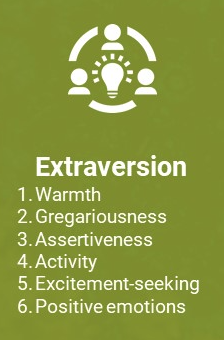Extraversion

Extraversion is one of the five dimensions of personality of the IPIP NEO Personality Inventory. It is marked by pronounced engagement with the external world.
Extraverts enjoy being with people, are full of energy, and often experience positive emotions. They tend to be enthusiastic, action-oriented, individuals who are likely to say “Yes!” or “Let’s go!” to opportunities for excitement. In groups they like to talk, assert themselves, and draw attention to themselves.
Introverts lack the exuberance, energy, and activity levels of extraverts. They tend to be quiet, low-key, deliberate, and disengaged from the social world. Their lack of social involvement should not be interpreted as shyness or depression; the introvert simply needs less stimulation than an extravert and prefers to be alone.
The independence and reserve of the introvert is sometimes mistaken as unfriendliness or arrogance. In reality, an introvert who scores high on the agreeableness dimension will not seek others out but will be quite pleasant when approached.
Extraversion Score
Low Extraversion
Your score on Extraversion is low, indicating you are introverted, reserved, and quiet. You enjoy solitude and solitary activities. Your socializing tends to be restricted to a few close friends.
Average Extraversion
Your score on Extraversion is average, indicating you are neither a subdued loner nor a jovial chatterbox. You enjoy time with others but also time alone.
High Extraversion
Your score on Extraversion is high, indicating you are sociable, outgoing, energetic, and lively. You prefer to be around people much of the time.
Extraversion Facets
- Friendliness. Friendly people genuinely like other people and openly demonstrate positive feelings toward others. They make friends quickly and it is easy for them to form close, intimate relationships. Low scorers on Friendliness are not necessarily cold and hostile, but they do not reach out to others and are perceived as distant and reserved.
- Gregariousness. Gregarious people find the company of others pleasantly stimulating and rewarding. They enjoy the excitement of crowds. Low scorers tend to feel overwhelmed by, and therefore actively avoid, large crowds. They do not necessarily dislike being with people sometimes, but their need for privacy and time to themselves is much greater than for individuals who score high on this scale.
- Assertiveness. High scorers Assertiveness like to speak out, take charge, and direct the activities of others. They tend to be leaders in groups. Low scorers tend not to talk much and let others control the activities of groups.
- Activity Level. Active individuals lead fast-paced, busy lives. They move about quickly, energetically, and vigorously, and they are involved in many activities. People who score low on this scale follow a slower and more leisurely, relaxed pace.
- Excitement-Seeking. High scorers on this scale are easily bored without high levels of stimulation. They love bright lights and hustle and bustle. They are likely to take risks and seek thrills. Low scorers are overwhelmed by noise and commotion and are adverse to thrill-seeking.
- Cheerfulness. This scale measures positive mood and feelings, not negative emotions (which are a part of the Neuroticism domain). Persons who score high on this scale typically experience a range of positive feelings, including happiness, enthusiasm, optimism, and joy. Low scorers are not as prone to such energetic, high spirits.
